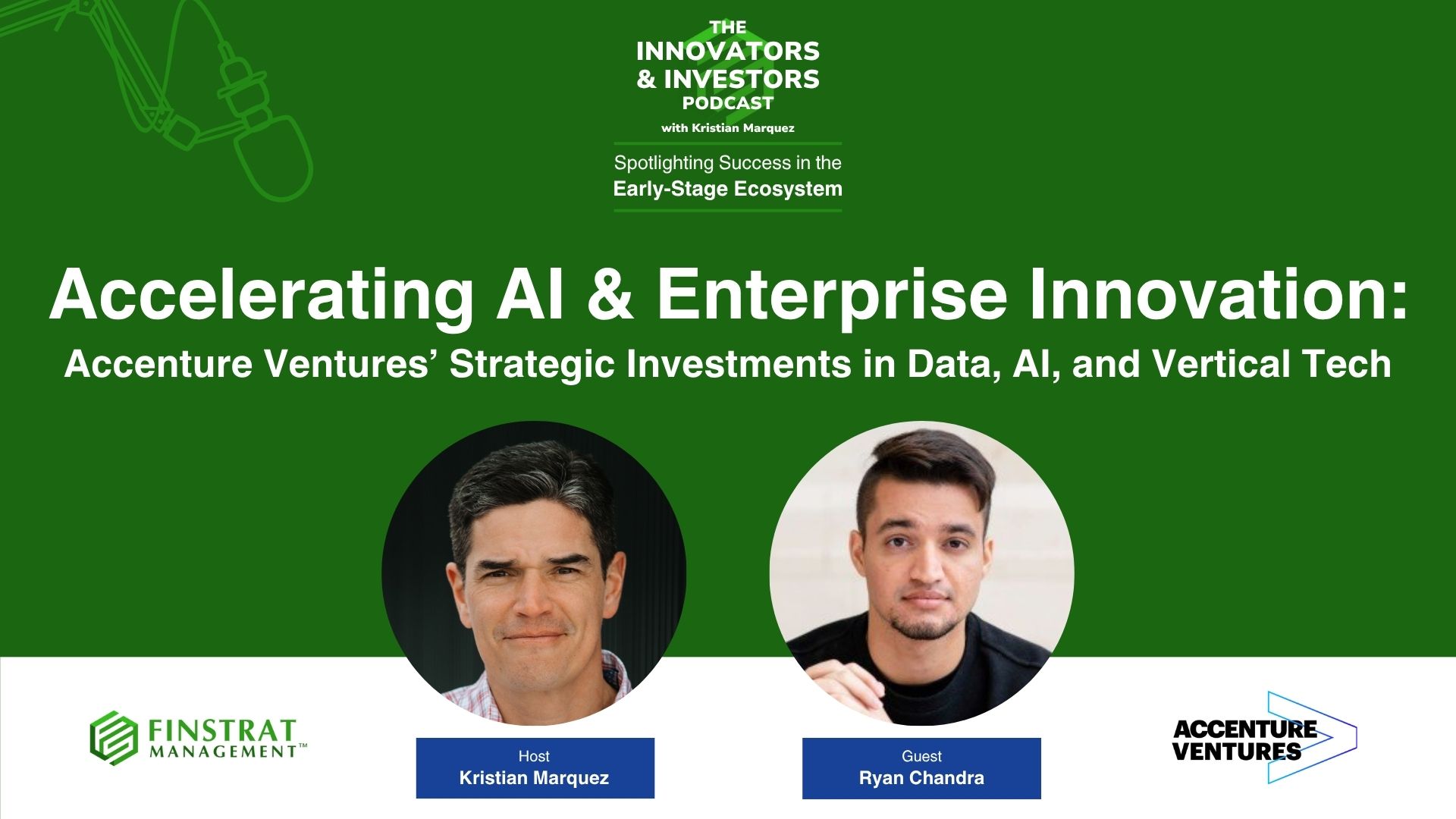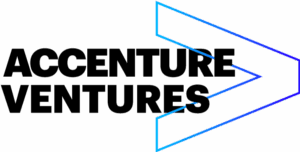Accelerating AI & Enterprise Innovation: Accenture Ventures’ Strategic Investments in Data, AI, and Vertical Tech
August 8, 2025 | 41 MIN

Highlights
- Accenture Ventures invests strategically in 10-15 emerging AI and data startups annually to accelerate enterprise adoption.
- Accenture Ventures operates globally, investing across multiple countries and industries with a focus on vertical AI solutions.
- Enterprise readiness, including integration with existing tech stacks and proven customer traction, is critical for CVC investments.
- AI technologies are converging—combining predictive, generative AI, and domain-specific workflows for industry verticals.
- The future of AI includes the merging of software, services, and hardware, especially in physical AI and robotics.
- Preparing an AI-ready workforce and using AI as a collaboration tool is essential for future job sustainability.
- Domain expertise, customer empathy, and distribution provide defensibility and differentiation beyond commoditized AI models.
Summary
In this episode of the Innovators and Investors Podcast, host Kristian Marquez interviews Ryan Chandra, the Data and AI Investment Lead at Accenture Ventures. Ryan provides comprehensive insights into Accenture Ventures’ investment thesis, focusing on strategic partnerships with emerging technology companies, particularly in data and AI. Accenture Ventures operates as the corporate venture capital arm of Accenture, investing off-balance sheet with a strong emphasis on strategic impact rather than purely financial returns. Ryan explains how Accenture leverages its vast global client base and deep industry expertise to help startups accelerate product-market fit and enterprise adoption.
Ryan highlights the critical role of AI, especially generative AI (Gen AI), in transforming enterprise workflows across industries, emphasizing the verticalization and convergence of AI technologies tailored to specific sectors like financial services, healthcare, manufacturing, and public sector. He stresses that the future of AI investment lies in integrating AI into hyper-specific workflows and combining software with services, as well as hardware, to create differentiated, defensible products.
The conversation also touches on the importance of “enterprise readiness,” where startups must demonstrate the ability to integrate with existing enterprise systems (like SAP) and show proven traction with large customers to attract corporate venture capital investments. Ryan shares his personal Silicon Valley roots and career journey from Stanford University to Accenture Ventures, underscoring the value of early engagement, expertise development, and taking risks in venture capital.
Looking ahead, Ryan envisions AI’s continued convergence across technologies, industry applications, and business models, with physical AI and robotics emerging as significant growth areas. He advocates for building an AI-ready workforce by reskilling employees and embracing AI as a tool to augment human creativity and efficiency rather than replace jobs. Finally, Ryan offers advice for founders to focus on domain expertise, customer empathy, and distribution as key differentiators in the AI era, and encourages young professionals to actively participate and engage in the venture capital ecosystem.
Key Insights
- Strategic Partnership Model Over Pure Investment: Accenture Ventures distinguishes itself by investing not just for financial returns but as a strategic partner. By leveraging Accenture’s client ecosystem and enterprise workflow expertise, they help startups achieve product-market fit faster. This approach addresses a common challenge startups face: navigating large corporate structures and accessing meaningful client relationships. The fund’s strategic impact KPI ensures alignment with Accenture’s broader business goals, enhancing startup success.
- Focus on Data and AI as the Core Enterprise Technology Theme: Ryan identifies data and AI, particularly generative AI, as the dominant investment focus. Enterprises are transitioning from experimentation to delivering real business ROI with AI, and startups play a pivotal role by providing verticalized, trustworthy AI solutions that complement hyperscalers and platform providers. This trend reflects a shift towards AI as a fundamental enterprise capability, not just a technical novelty.
- Industry-Agnostic but Vertically Specialized Investments: While Accenture Ventures invests across industries, success requires startups to specialize deeply within vertical workflows. The fund’s access to multiple tier-one clients in sectors like financial services, manufacturing, and public sector allows it to offer unique domain insights, enabling startups to tailor solutions that address nuanced market needs and regulatory complexities. This vertical focus is essential for building defensibility in crowded AI markets.
- Convergence of Technologies, Workflows, and Business Models: The next 12-24 months will see AI technologies converging—combining predictive AI with generative AI, integrating AI deeply into vertical workflows, and merging software with services and hardware. This convergence signals a structural shift in how AI products are developed and commercialized, requiring startups to think beyond isolated AI capabilities to integrated, end-to-end solutions that deliver tangible enterprise value.
- Physical AI and Robotics as an Emerging Frontier: Beyond digital AI applications, the physical AI space—including robotics, manufacturing automation, and smart devices—represents a major growth area. Accenture Ventures’ investment in companies like Sanctuary AI illustrates this trend. The emergence of edge AI stacks and robotics-specific tech architectures signifies that AI’s impact will extend far beyond software, transforming physical environments and workflows.
- AI as an Augmentation Tool, Not a Replacement: Ryan emphasizes the importance of building an AI-ready workforce through reskilling and education. AI should be viewed as a collaborator and productivity enhancer rather than a job destroyer. This perspective aligns with the idea that AI will automate repetitive tasks, freeing professionals to focus on higher-value, creative, and strategic work. Human-in-the-loop models will remain critical for validating intent and ensuring quality in AI-driven processes.
- Founders’ Defensibility Lies in Domain Expertise, Data, and Distribution: With AI models becoming increasingly commoditized, competitive advantage will come from hard-to-access data, deep domain knowledge, and customer relationships. Empathy and understanding of customer workflows create differentiated products that hyperscalers cannot easily replicate. Additionally, marrying software with hardware or services can create barriers to entry, making such startups attractive targets for corporate venture capital that values strategic fit.
- Global and Remote Investment Landscape: Accenture Ventures operates with a global mandate, investing across continents and emphasizing execution and local market understanding over geographic location. COVID-19 has flattened venture capital geography, enabling virtual engagement with founders worldwide. This global reach allows Accenture Ventures to access diverse innovation hubs while tailoring support to regional market dynamics and customer bases.
- Enterprise Readiness as a Critical Due Diligence Lens: Unlike financial VC funds, Accenture Ventures places high importance on enterprise readiness—meaning startups must demonstrate the ability to integrate with large corporations’ existing technology stacks, comply with rigorous security and operational requirements, and show early traction with Fortune 500 customers. This focus ensures that investments can translate into real-world deployments and strategic partnerships.
- Career and Personal Growth Advice for Venture Capital Aspirants: Ryan shares that early-career hesitation can be overcome by actively engaging in industry events and conversations, developing subject matter expertise quickly, and confidently contributing to discussions. His own journey from Stanford internships to leading AI investments at Accenture Ventures underscores the value of diverse experiences, risk-taking, and continuous learning in the venture capital ecosystem.
Conclusion
Ryan Chandra’s insights provide a nuanced understanding of how a leading corporate venture capital fund like Accenture Ventures approaches AI and data investments. The fund’s strategic, partnership-driven model, global reach, and emphasis on enterprise readiness distinguish it in a competitive market. As AI continues to evolve, the convergence of technologies and business models, combined with domain expertise and physical AI innovation, will shape the next wave of enterprise transformation. For founders, aligning with strategic investors like Accenture Ventures offers unique advantages in scaling and navigating complex enterprise sales cycles. For professionals and investors, preparing for an AI-driven future requires embracing collaboration between humans and machines, continuous reskilling, and a focus on differentiated value creation.
Stay up-to-date with Ryan Chandra and his work with Accenture Ventures.
Follow the show on your podcast channel of choice or listen below.




